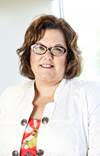
You may have noticed the increase in interest in early childhood education (ECE) programs on a national scale. Finally! The topics of child care and ECE have come up in election speeches, legislation, news articles, blogs, and social media on a regular basis. States are using Race to the Top and other funding, as well as adding early learning standards and quality improvement systems (QRIS), with many requiring programs to participate to receive funding. Early childhood educators are being required to go back to school and increase their education for Accreditation or QRIS systems.
The momentum is strong and the energy is high!
As a part of a national, online, higher education, early childhood teacher preparation program, I am challenged to support students from across the country as they implement 50 state-specific standards. At Rasmussen College, we are approached by each state to offer specific curriculum to meet that state’s standard or quality rating system—each being different and unique. Since we are a national program and serve students from almost all the states, it has become quite the challenge!
The goal of supporting all students regardless of their state of residence is important not just to the growth of our program, but also to the field and our work together for the betterment of all children. So, we created assessments throughout our courses so students would research their state specific standards and systems, bringing their state perspective to their work and to the course. Discussion forums, assessments, case studies, and group conversations contribute to the national discourse, allowing students to better understand and implement what they learn into their practice. Students can also experience other perspectives of a similar standard, thus broadening their viewpoints on ECE.
We have also carefully thought about how to provide experience with various program assessments and quality indicators, such as NAEYC Accreditation and CLASS. With each ECE program choosing their own quality assessments, being influenced by state standards, or seeking to verify different indicators, we chose to look at those with national recognition as a bridge. For us, this means looking at tools such as CLASS to offer a consistent message and support system for all students from all states with all standards on quality interactions and relationships with children and families. Quality interactions and relationships are the cornerstone of teacher and classroom quality. I believe that if this cornerstone is laid, all else will fall into place naturally for the both the teacher and child.
Focusing on interactions and relationships in a teacher preparation program can be an uphill battle when there are many other demands on our professors' and our students' time—like implementing curricula and assessments, meeting state requirements, and so on. But programs preparing students to become future educators need to look beyond just teaching about activities and dive deeper to build the cornerstone on more solid ground. If we know what is most important then we need to make sure other stakeholders do as well, especially our future teachers.
Early childhood education is changing quickly and we need to make sure we are looking beyond our immediate influence to that of the entire field to ensure that we build ECE as a field of practice for all children. For us in higher education, the ability to use national standards, quality indicators, and assessments is way for us to provide an opportunity for students to see beyond their borders and see children as children no matter where they or we reside.
 Mary Muhs has worked in the Early Childhood Education field for over 27 years and earned a M.Ed. in Early Childhood Education Administration from National Louis University. Her experience includes teaching young children from birth through pre-kindergarten and leading in large and small for-profit and non-profit programs from Illinois to Ohio to Minnesota. Since joining Rasmussen College in 2010, her focus has been on mentoring, training and educating ECE professionals to motivate our youngest citizens. She is currently working on an Ed.D in Early Childhood Education through Walden University.
Mary Muhs has worked in the Early Childhood Education field for over 27 years and earned a M.Ed. in Early Childhood Education Administration from National Louis University. Her experience includes teaching young children from birth through pre-kindergarten and leading in large and small for-profit and non-profit programs from Illinois to Ohio to Minnesota. Since joining Rasmussen College in 2010, her focus has been on mentoring, training and educating ECE professionals to motivate our youngest citizens. She is currently working on an Ed.D in Early Childhood Education through Walden University.

